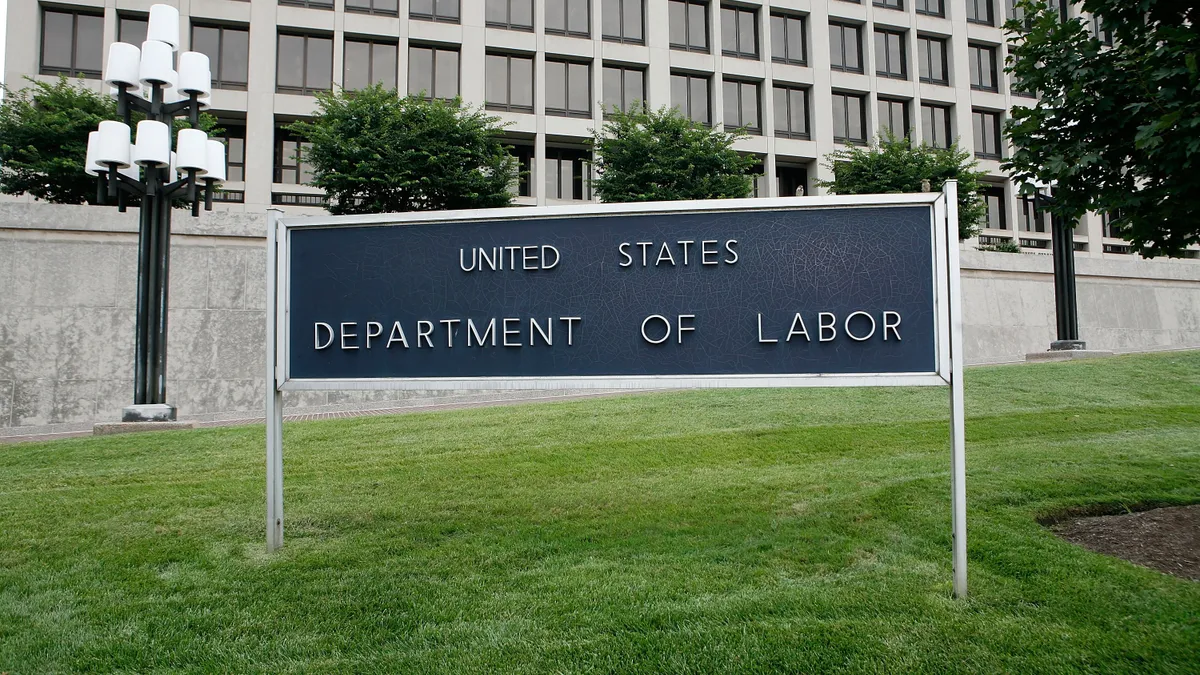Dive Brief:
- A trial over the Labor Department’s ESG rule begins next week, in the wake of the U.S. Supreme Court’s overturning of the Chevron doctrine. The case stems from an appeal submitted by 26 Republican state attorneys general challenging the agency’s rule allowing pension fund managers to consider ESG factors.
- The case will become the first rule concerning ESG to go before a judge in the post-Chevron era when the trial begins July 9. The lawsuit was initially dismissed by a U.S. District Court last September, which ruled it did not run afoul of the Employment Retirement Income Security Act of 1974 and cited the now-overturned doctrine in the dismissal.
- In a court filing submitted June 28 — the same day Chevron was overturned — the attorneys general noted the U.S. District Court’s deference under the doctrine in its dismissal of the case. However, the Labor Department’s attorney said in a response Monday that the prior brief did not mention the doctrine, and that the defendant agrees with the plaintiffs that the court should “resolve the issue of statutory interpretation that this case presents.”
Dive Insight:
At issue in the case is the Labor Department’s rule, “Prudence and Loyalty in Selecting Plan Investments and Exercising Shareholder Rights.” The rule allows pension fund managers to consider ESG factors when making investment decisions, but only as a tiebreaker when two or more investments “equally serve the financial interests of the plan,” as the agency reiterated in its March response to the appeal.
The agency maintained in its March response that the rule is “valid” even without the construct of the Chevron doctrine, which had previously told courts to give deference to agencies’ interpretations of statutes. The Labor Department’s July 1 filing — submitted by Daniel Winik, a lawyer for the Department of Justice’s Civil Division appellate staff — reinforced that view and said the agency has “for three decades consistently rejected the interpretation [of the tiebreaker standard] that plaintiffs advance.”
“Across administrations, the Department has recognized that when fiduciaries cannot choose among investments on the basis of risk and return, and prudence requires that they make a choice, ERISA leaves them free to consider factors other than risk and return,” Winik wrote.
Winik said it will be for the court to decide, in the case of tiebreakers, what ERISA would require a fiduciary to do when multiple investments equally benefit a plan “and transactional or monitoring costs make it imprudent for a fiduciary to diversify among them.” However, he said the decision in the case that axed the Chevron doctrine, Loper Bright Enterprises v. Raimondo, reaffirmed that courts “may properly resort for guidance” to the experience of those responsible for implementing laws and statutes. Additionally, Winik cited a part of the ruling that held “interpretations issued contemporaneously with the statute at issue, and which have remained consistent over time, may be especially useful in determining the statute’s meaning.”
The parties challenging the rule also noted that aspect of the ruling in their June 28 letter to the court but came to a different conclusion. The lawyers for the plaintiffs noted the ruling also stated “interpretations of ERISA that authorized nonpecuniary tiebreaker considerations came well after enactment.”
Winik also acknowledged the time between initial enactment in the publication of the tiebreaker standard — first published in 1994, two decades after ERISA was enacted — in his response. Though the agency’s lawyer noted the agency said in the 1994 publication that its analysis was based on principles it established through responding to prior opinion requests.
The Republican attorneys general who led the initial lawsuit announced they would appeal the dismissal last fall. In January, Liberty Energy and energy trade association Western Energy Alliance also joined the Republican-led states in their appeal, arguing the rule is unlawful. Utah Attorney General Sean Reyes, who led the suit alongside Texas Attorney General Ken Paxton, said the group is willing to appeal the decision to the Supreme Court.
The trial for the appeal will be held at the U.S. Fifth Circuit of Appeals in New Orleans beginning July 9 at 9 a.m. Central Standard Time.
Correction: In a previous version of this article, Daniel Winik's name was misspelled.











